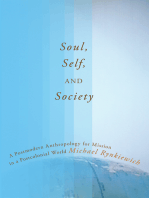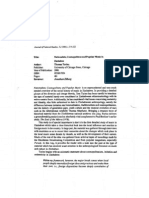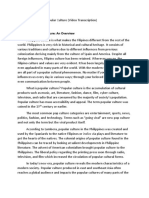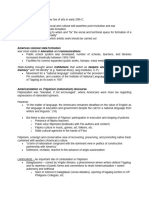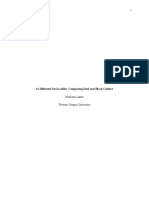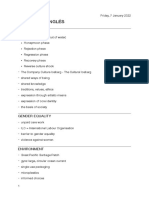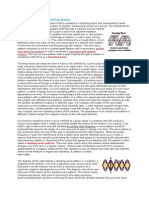Professional Documents
Culture Documents
Assessment 1: Written Assignment
Assessment 1: Written Assignment
Uploaded by
Lucía RuizOriginal Description:
Original Title
Copyright
Available Formats
Share this document
Did you find this document useful?
Is this content inappropriate?
Report this DocumentCopyright:
Available Formats
Assessment 1: Written Assignment
Assessment 1: Written Assignment
Uploaded by
Lucía RuizCopyright:
Available Formats
Assessment 1
Written assignment
Lucía Ruiz Fernández - 23 October 2021
The following questions will be answered in this assignment:
1. A number of different “cultures” are mentioned in the podcast. Identify a few of them,
say what they are and what characterises them as cultures.
2. The tracks played on the podcast are all relevant to a part of Tom Ilube’s life. Explain
how each piece of music is significant for him.
3. Tom Ilube talks about his father’s and his own experience of racism. What are these
experiences and how do they deal with them? What aspects of people’s culture do you think
cause racist and xenophobic attitudes and reactions?
4. How do you think people from outside your culture view it and what shapes that vision?
Do you think it is accurate?
ASSESSMENT 1 - LUCÍA RUIZ 1
Cultures mentioned in the podcast
The Oxford Dictionary of English defines culture as “the arts and other
manifestations of human intellectual achievement regarded collectively”, as well as “the
ideas, customs, and social behaviour of a particular group or society”. However, the
etymology of the word reveals that it wasn’t until the 19th century that “culture” took this
definition. In Middle English, “culture” derived from the Latin “colere”, which means ‘to
tend or cultivate’. It was in the 16th century when this notion developed into the
definition of culture as the “cultivation of the mind, faculties, or manners” (“Culture”,
2020).
Going back to the origin of the word, we can understand the peoples of the world as
a collection of cultures or crops that grow on the surface of the Earth. They all sprout from
the same soil, but their leaves look different, and they search for sunlight in different
ways. In the interview, several of these cultures are mentioned. Some of them will be
described in the following paragraphs:
African culture
Tom Ilube is of African descent, and in the interview he talks about his childhood
years in Nigeria, Uganda and Kenya. In this section we will analyse African culture as a
whole:
Africa is inhabited by numerous ethnicities whose mores, values and beliefs vary
from one to another, thus it is not completely correct to use the term “African culture” to
englobe all the human groups that inhabit the continent. “But in spite of their various
cultures, Africans do share some dominant traits in their belief systems and have similar
values that mark them out from other peoples of the world” (Idang, 2015).
The traits that characterise African culture are understood by G.E. Idang (2015) as
values that are “inextricably bound together”. It is so that religious, moral, political, social,
aesthetic and economic values are all inseparable from one another. For instance, all across
the continent, festivals and carnivals are organised to promote fertility and hard work,
ASSESSMENT 1 - LUCÍA RUIZ 2
which are core values of the African peoples. With regard to religion, there is a
widespread belief in the concept of the Supreme Being, of the immortality of the soul and
of the existence of good and evil. These values are also intertwined in politics: in some
cases, disloyalty to a superior is comparable to disloyalty to God. It is also important to
note that artistic production is mainly religion-driven. Finally, African economies are
marked by cooperation and by tradition. The young are often seen as the main labour
force, hence the emphasis on fertility (Idang, 2015). We can see a clear example of this in
the podcast, when Tom Ilube talks about his father’s considerable offspring.
Caribbean culture & Afro-Caribbean people
When Lauren Laverne introduces Tom Ilube, she mentions the Powerlist, “an annual
publication that was first published in 2007 in a bid to provide professional role models
for young people of African and African Caribbean heritage” (The Powerlist 2020, n.d.).
As in the previous section, it must be understood that the term “Caribbean culture”
refers to the body of ethnic groups that inhabit the countries of the Caribbean. The
singularity of these groups is their diversity: their cultures are a mixture of “colonial
mainstays and pervasive influences of the region’s major ethnic groups, such as the East
Indians and Africans” (Smith, n.d.).
Regarding African-Caribbean or Afro-Caribbean people, they are Caribbeans of
African ancestry. Their African origins trace back to the colonial slave trade across the
Atlantic, back in the 15th to 19th century, which provided labour force for households and
sugar plantations (“Afro-Caribbean People,” 2021).
Multiracial people
ASSESSMENT 1 - LUCÍA RUIZ 3
Multiracial or mixed-race people are people of more than one race or ethnicity. I
understand this collective as a culture because they share a set of characteristics and, in
many places, they have formed sub-groups. For example, Latin children and teenagers
that have been born in the US identify themselves with their parents’ Hispanic cultures,
but they also belong to the North American culture. As a consequence, they have
developed Spanglish, a language that is the product of intercultural contact.
Multiracial people, however, often face a double discrimination. This is clearly
explained by A. Greig in an article about multiracial youth (2013):
“Among the multiple types, one is exclusion or isolation in which multiracial people
are excluded due to their mixed status. For example, an Asian and white biracial child
may not be treated as equally as his or her monoracial siblings or cousins at family
gatherings by disapproving distant relatives. Another type is assumption of being
monoracial or mistaken identity. For example, a child at a school telling jokes targeted
toward black Americans to a biracial black and white child. The child assumes the biracial
child is white and therefore feels it is "okay" to say the jokes, which are actually offensive
to the biracial child” (Johnston & Nadal, 2010).
Tom Ilube faced something similar to the latter when his face was blacked up to play
the role of Young Johnny Jones at a school function.
1970s London
Finally, “culture” also refers to “the characteristic features of everyday existence
(such as diversions or a way of life) shared by people in a place or time” (“Culture,” n.d.).
Therefore, the culture of 1970s London must also appear in this analysis.
Tom Ilube’s teenage years were characterised by his quest of personal identity as a
mixed-race kid (his mother came from a privileged sphere of the English society and his
father was Nigerian) in a society that remained overtly racist: 1970s Great Britain.
ASSESSMENT 1 - LUCÍA RUIZ 4
The staggering financial and political landscape of the time coexisted with a
flourishing cultural scene. Radical ideological, musical and fashion trends attracted young
Londoners. People from the margins of society were suddenly under the spotlight: punks,
Caribbean and Irish immigrants, American exiles, etc., many of whom became pop- and
rockstars who revolutionised the music industry (Silverton, 2000).
The colourfulness and the sense of freedom that surrounded Tom Ilube in his
teenage years probably contributed to his sense of entrepreneurship and to his will to
make the world a better place.
Tracks
Tom Ilube’s selected tracks are a reflection of his multicultural background, and they
each relate to a particular moment in his life, to his entourage or to his personality. But his
picks are not only emotional: they are also political. Many of the songs on his playlist are
interpreted by artists of mixed racial descent. Tom identifies himself with them, with their
songs, and his wise choice of music conveys a message of equity. This message is of
paramount importance in today’s world, where the word “globalisation” clashes with
terms such as “Asian hate”, “white privilege” and “structural racism”.
Doctor Who, original theme music (04:13)
Tom Ilube is a kid of 1960s Britain, and his first musical pick is a clear sign of that.
Doctor Who, first broadcast in 1963, has stood by generations of Brits who fondly
remember the series. Tom Ilube is just another one of those children whose feet danced
excitedly to the theme music of the unique BBC production. In his interview, he says that
Doctor Who “was the theme tune to his childhood”, and that indeed, his first word was
“Dalek”, an extraterrestrial species that appeared on the show. In addition, his father
worked for the BBC at the time, so Tom felt a personal connection to the network.
ASSESSMENT 1 - LUCÍA RUIZ 5
Sweet Mother, Prince Nico Mbarga (08:40)
Tom’s second pick is this jolly Nigerian song, written in Pidgin English, that is an
ode to the mother figure. In African music, the jolliness of the rhythm blends perfectly
with the deepness of the lyrics: “I won’t forget you for the suffer that you suffered for
me”, sings Prince Nico Mbarga. The fact that Tom chooses a song in Nigerian Pidgin this
time is of great interest, as he subtly addresses the impact of colonisation.
The Boys Are Back In Town, Thin Lizzy (13:50)
The Boys are Back In Town is the work of a mixed race rockstar, Thin Lizzy, with
whom Tom clearly identified. The context is 1970s London, a boiling pot of ideologies,
music styles and fashion trends that left no one indifferent. In the midst of the turmoil,
Tom tried to find his personal identity as a teenager of African descent, as well as to fit in
in a society that still remained overtly racist, despite its colourful surface.
Swing Low Sweet Chariot, Ladysmith Black Mambazo (17:33)
Tom Ilube’s fourth pick is a tune in memory of two people: the first is his brother,
from whom Tom inherited his passion for rugby (Tom is now the new chairman of the
ASSESSMENT 1 - LUCÍA RUIZ 6
English Rugby Football Union), and who died in 2012. Tom recalls a time when his older
sibling and he would sit on stadium stands and sing this song during rugby games. The
second person is Minerva Willis, the original voice of the song, and the epitome of the
Black, enslaved woman who keeps beings erased out of history (she was the wife of Uncle
Willis; they both worked in a plantation in Oklahoma and become known in the region for
their songs, which later received the name of “spirituals”).
That’s The Way Love Goes, Janet Jackson (21:00)
Janet Jackson’s 90s song is the soundtrack to Tom and his wife’s honeymoon. He
recalls driving through route 66, both of them nodding their heads to the music, and “all
was good in the world”.
Family Business, Kanye West (25:35)
Mr. Ilube is, like ABBA once sang, “a family man”. His sixth track plays on the
background while he talks about his big, tight-knit family, which he calls the source of his
confidence and strength. Both this and the former song are tied to fond memories with his
loved ones.
ASSESSMENT 1 - LUCÍA RUIZ 7
Mr. Bojangles, Sammy Davis Jr (28:20)
This heart-wrenching tune is the one that Tom Ilube would save if he could only
keep one of the eight because, in his words, “that’s me”. A blue melody sounds in the
background, while a powerful voice tells the story of Mr. Bojangles, a man who danced
“throughout the south”. Tom Ilube, a person of African descent, highlights the importance
of telling one’s own story, and echoing Chimanda Adichie’s talk The danger of a single story
(TED, 2009), he cites an African proverb: “Until lions have their own storytellers, tales of
the hunt will always favour the hunter”.
A Change Is Gonna Come, Sam Cooke (Ayanna Witter-Johnson’s version) (32:25)
! !
Sam Cooke’s song is considered to be “an anthem for the Civil Rights
Movement” (“A Change Is Gonna Come”, 2021). The interviewee says that he has had a
“fair share of challenges in his career”, but that he has overcome them and wants to try
and bring about change. He has done so by becoming the first black chair of a British
sports organisation, as well as by founding the African Gifted Foundation and of the
African Science Academy, which “provide opportunities to gifted young women from
across Africa, focusing specifically on STEM subjects” (African Gifted Foundation, “About
Us” section), among many other initiatives (in the podcast, he also talks about the Nommo
literary prize, which he has funded for several years).
Ayanna Witter-Johnson, the young cellist who interprets the version played on the
podcast of Cooke’s classic, is, in Ilube’s words, the embodiment of “brilliant change”. This
ASSESSMENT 1 - LUCÍA RUIZ 8
musician of Jamaican descent is part of a new wave of young artists who are transforming
the musical and cultural scene (Barnett & Rani, 2021).
Racism
Tom’s father’s experience with racism
In the podcast, Mr. Ilube shares that his father joined the army at the age of fourteen
as a way out of the Nigerian village where he lived. At the time, joining the military was
the only opportunity villagers had to improve their living conditions. His father was then
chosen amongst a few lucky who would travel to the UK and receive training as
engineers. Once in Great Britain, his father was the first black man to get a job as an
electrical engineer at the BBC. He faced overt racism from the beginning, but he
challenged discrimination with his toughness and intelligence.
Tom talks about particularly uncomfortable experiences, when some coworkers
would come up to his father and rub his face, then saying “yours doesn’t come off”. They
had confused Tom’s father with one of the characters of the Black and White Minstrel
Show, in which white actors were “blacked up” in order to play characters of African
descent.
Tom’s experience with racism
As a multiracial kid in 1960s and 1970s London, Tom faced multiple form of covert
and overt racism. He describes a “pretty tough experience” that drove him to tears at a
young age. He was cast to play a black role in a school play, and the makeup lady decided
ASSESSMENT 1 - LUCÍA RUIZ 9
to “black him up”. Tom started crying because he felt the “impending doom of
humiliation”: his family was attending the play and they would be deeply hurt if they
saw their son in blackface. This experience, however, helped Tom to build a shield around
him. He says that he was tough when he needed to be, and that he stood his own ground.
Sometimes he fought against bullies, and other times he just navigated conflict. In
addition, in his teenage years he became a “rugby boy”, in his words, so he had the
“protection” of his teammates and friends.
Fast-forwarding in time, Tom also suffered racist episodes in adulthood. He tells that
when he first came to work in the City, racially-biased remarks were made behind his
back, and he even came across an offensive cartoon of a monkey with his name on it. He
did not complain to his superiors about it, not wanting “to play the race card so soon”.
Nevertheless, his boss called out the person who had drawn the cartoon in an email that
was sent to all the employees of the company, showing that there was no place for racism
in his office.
My culture
“There is no night life in Spain. They stay up late but they get up late. That is not night life.
That is delaying the day.”
- Ernest Hemingway
Spaniards are famous all over the world for their charm, wit and artistry.
Curabitur vulputate viverra pede
Consectetuer arcu ipsum ornare pellentesque vehicula, in vehicula diam, ornare
magna erat felis wisi a risus. Justo fermentum id. Malesuada eleifend, tortor molestie, a a
vel et. Mauris at suspendisse, neque aliquam faucibus adipiscing, vivamus in. Wisi mattis
leo suscipit nec amet, nisl fermentum tempor ac a, augue in eleifend in venenatis, cras sit
id in vestibulum felis in, sed ligula. In sodales suspendisse mauris quam etiam erat, quia
ASSESSMENT 1 - LUCÍA RUIZ 10
tellus convallis eros rhoncus diam orci, porta lectus esse adipiscing posuere et, nisl arcu
vitae laoreet. Congue porta scelerisque praesent at, lacus vestibulum et at dignissim cras
urna, ante convallis turpis duis lectus sed aliquet, at et ultricies.
Morbi integer molestie, amet suspendisse morbi, amet maecenas, a maecenas mauris
neque proin nisl mollis. Suscipit nec ligula ipsum orci nulla, in posuere ut quis ultrices,
lectus primis vehicula velit hasellus lectus, vestibulum orci laoreet inceptos vitae, at
consectetuer amet et consectetuer. Praesent integer leo orci aliquam, nibh a. Diam nobis,
erat natoque integer fringilla viverra. Fermentum pede fringilla urna semper, pede quam
scelerisque et enim in commodo, dictum a consequatur arcu adipiscing volutpat.
References
Laverne, L. (Host). (2021, October 21). Tom Ilube, entrepreneur [Audio podcast episode].
In Desert Island Discs. BBC Radio 4. https://www.bbc.co.uk/programmes/
m00106jx
The Powerlist 2020. (n.d.). Powerful Media. Retrieved October 24, 2021, from https://
www.powerful-media.co.uk/powerlist
Culture. (n.d.). In Oxford Dictionary of English. Oxford University Press
Idang, G. E. (2015). African culture and values. Phronimon, 16(2), 97–111. http://
w w w . s c i e l o . o r g . z a / s c i e l o . p h p ?
script=sci_arttext&pid=S1561-40182015000200006&lng=en&tlng=en
Smith, A. (n.d.). What are the cultural characteristics of the Caribbean? Rehabilitation Robotics.
Retrieved October 24, 2021, from https://rehabilitationrobotics.net/what-are-the-
c u l t u r a l - c h a r a c t e r i s t i c s - o f - t h e - c a r i b b e a n /
#What_are_the_cultural_characteristics_of_the_Caribbean
Afro-Caribbean people. (2021, October 18). In Wikipedia. https://en.wikipedia.org/wiki/
Afro-Caribbean_people
ASSESSMENT 1 - LUCÍA RUIZ 11
Greig, A. (2013, August). Seven essential facts about multiracial youth. American
Psychological Association. Retrieved October 24, 2021, from https://www.apa.org/
pi/families/resources/newsletter/2013/08/multiracial-youth
Culture. (n.d.). In Merriam-Webster. https://www.merriam-webster.com/dictionary/
culture
Silverton, P. (2000, December 7). London 1970s overview. Encyclopedia Britannica. https://
www.britannica.com/topic/rock-London-1970s-overview-1371204
The danger of a single story. Chimamanda Ngozi Adichie. (2009, October 7). [Video].
YouTube. https://www.youtube.com/watch?v=D9Ihs241zeg
Wikipedia contributors. (2021, October 6). A Change Is Gonna Come. Wikipedia. https://
en.wikipedia.org/wiki/A_Change_Is_Gonna_Come
African Gifted Foundation. (2021). African Gifted Foundation. https://
www.africangifted.org
About Nommos. (2017). African Speculative Fiction Society. https://www.africansfs.com/
about-nommos
Barnett, E. & Rani, A. (Host). (2021, March 19). Singer-songwriter and cellist Ayanna
Witter-Johnson [Audio podcast episode]. In Woman’s Hour. BBC Radio 4. https://
www.bbc.co.uk/programmes/m000t76q
Spanish Culture - Core Concepts. (n.d.). Cultural Atlas. Retrieved October 24, 2021, from
https://culturalatlas.sbs.com.au/spanish-culture/spanish-culture-core-concepts
ASSESSMENT 1 - LUCÍA RUIZ 12
You might also like
- Module 1Document7 pagesModule 1Jewel Hart Arconeda83% (12)
- History and Evolution of Philippine Popular CultureDocument10 pagesHistory and Evolution of Philippine Popular CultureBaucas, Rolanda D.100% (2)
- MODULE 5 - Identities and Pop CultureDocument5 pagesMODULE 5 - Identities and Pop Culturejoy castillo100% (1)
- Soul, Self, and Society: A Postmodern Anthropology for Mission in a Postcolonial WorldFrom EverandSoul, Self, and Society: A Postmodern Anthropology for Mission in a Postcolonial WorldNo ratings yet
- Rock School Guitar Grade 2Document22 pagesRock School Guitar Grade 2Krysh Maniyil100% (1)
- Appendix A. Answer Key For Written ExericisesDocument107 pagesAppendix A. Answer Key For Written ExericisesPierre MedinaNo ratings yet
- Orientalism: Dr. R. SoundararajanDocument27 pagesOrientalism: Dr. R. Soundararajansoundar12100% (1)
- The Interpretation of Music in PerformanceDocument12 pagesThe Interpretation of Music in PerformanceYana100% (1)
- Joe Pass-My RomanceDocument16 pagesJoe Pass-My RomanceAldo Mannari100% (9)
- Nigerian Popular Culture and The Moral QuestionDocument17 pagesNigerian Popular Culture and The Moral QuestionoluwatoyiseNo ratings yet
- Empowering Indigenous YouthDocument11 pagesEmpowering Indigenous Youthapi-359530834No ratings yet
- Lesson 2Document7 pagesLesson 2TAYABAN, KENNETH JAKE, Q.No ratings yet
- Ganito Kami Noon Paano Kayo NgayonDocument2 pagesGanito Kami Noon Paano Kayo NgayonPrincess Pauline LoridoNo ratings yet
- Notes in Ge 12 ElecDocument39 pagesNotes in Ge 12 ElecRika IglesiaNo ratings yet
- Ferguson MimicryDocument20 pagesFerguson MimicryBerlano AndradeNo ratings yet
- Identities and Popular CultureDocument4 pagesIdentities and Popular CultureDelia TadiaqueNo ratings yet
- Colonialism and PostcolonialismDocument10 pagesColonialism and PostcolonialismSebastian TaberaNo ratings yet
- Kyle Lit Review Pop CultureDocument4 pagesKyle Lit Review Pop CultureCyril CauilanNo ratings yet
- What Is Pop Culture Part IDocument13 pagesWhat Is Pop Culture Part IRajPihuNo ratings yet
- 01 Handout 1Document5 pages01 Handout 1Nathaniel IbabaoNo ratings yet
- Com e 1Document5 pagesCom e 1psychesparecNo ratings yet
- 10.+Art+and+Society Student+Document12 pages10.+Art+and+Society Student+shaneleimercadoNo ratings yet
- Extant Filipino Film Music in Pre War ManilaDocument24 pagesExtant Filipino Film Music in Pre War ManilaPaul Earvin BibalNo ratings yet
- Cparq1 W1 Day3 4Document30 pagesCparq1 W1 Day3 4kishpejiNo ratings yet
- Philippine Studies Vol. 37, No. 4 (1989) : 503-508Document16 pagesPhilippine Studies Vol. 37, No. 4 (1989) : 503-508mark vincent santiagoNo ratings yet
- Philippine Popular Culture ReportDocument27 pagesPhilippine Popular Culture ReportJohn Casayuran Malunas0% (1)
- PPC Lesson1Document6 pagesPPC Lesson129camziiNo ratings yet
- Nationalism and PatriotismDocument46 pagesNationalism and Patriotismjhondhel torresNo ratings yet
- Nationalists Cosmopolitans and Popular Music in ZimbabweDocument9 pagesNationalists Cosmopolitans and Popular Music in ZimbabweJonathan ZilbergNo ratings yet
- Colonialism: Race, Identity and NationDocument40 pagesColonialism: Race, Identity and NationRangothri Sreenivasa SubramanyamNo ratings yet
- The Contemporary World Lesson Iv: A World Ideas A. Popular Music and Globalization A. Lesson OutlineDocument8 pagesThe Contemporary World Lesson Iv: A World Ideas A. Popular Music and Globalization A. Lesson OutlineJinky PamittanNo ratings yet
- Origins and Philippine ContextDocument13 pagesOrigins and Philippine Contextjonelyn.ampoloquioNo ratings yet
- Eeuu II Literature ExamDocument28 pagesEeuu II Literature ExamEspe PascualNo ratings yet
- Cultural CuesDocument32 pagesCultural Cuesmaria_nazNo ratings yet
- Module - 5 SOCIAL STUDIESDocument14 pagesModule - 5 SOCIAL STUDIESGervin CapablancaNo ratings yet
- Philippine Popular Culture: An OverviewDocument6 pagesPhilippine Popular Culture: An OverviewleiNo ratings yet
- Philippine Popular CultureDocument21 pagesPhilippine Popular Culturerhianne badanoyNo ratings yet
- Dominican Republic Culture EssayDocument6 pagesDominican Republic Culture Essayd3gkt7pdNo ratings yet
- Strangers in Their Own LandDocument3 pagesStrangers in Their Own LandJoshua Marc AlcauseNo ratings yet
- Key Concepts in Social AnthropologyDocument5 pagesKey Concepts in Social Anthropologysafri MKU100% (1)
- COLONIALSIMsdDocument7 pagesCOLONIALSIMsdFrostmourneNo ratings yet
- The Construction and Representation of Race and Ethnicity in The Caribbean and The World.Document277 pagesThe Construction and Representation of Race and Ethnicity in The Caribbean and The World.Fernanda Carvalho100% (1)
- CHOCQUIBTOWN: Young Voices Shattering Afro-Colombian InvisibilityDocument22 pagesCHOCQUIBTOWN: Young Voices Shattering Afro-Colombian Invisibilitydiamath8755No ratings yet
- Philippine LiteratureDocument73 pagesPhilippine LiteratureIsabel Grace VictorNo ratings yet
- Persuasive Abortion EssayDocument8 pagesPersuasive Abortion Essayafabfoilz100% (2)
- 21st LiteratureDocument49 pages21st LiteratureMark Lawrence VillanuevaNo ratings yet
- LANCE TIU Filipino Identity PDFDocument2 pagesLANCE TIU Filipino Identity PDFLance TiuNo ratings yet
- SAGE International Encyclopedia of MusicDocument6 pagesSAGE International Encyclopedia of MusicEddie Henry Kachitsa100% (1)
- Chapter 10 Popular Culture & ICDocument8 pagesChapter 10 Popular Culture & ICAdelinaHocaNo ratings yet
- Wika Kasaysayan NotesDocument4 pagesWika Kasaysayan NotesMackyNo ratings yet
- Essay Hybrid IdentitiesDocument12 pagesEssay Hybrid IdentitiesMarije Scheffer-van EckNo ratings yet
- Modern African Literature and Cultural IdentityDocument15 pagesModern African Literature and Cultural IdentityArnel BugatanNo ratings yet
- I. Philippine Literature: Contemporary Period: EnglishDocument6 pagesI. Philippine Literature: Contemporary Period: EnglishAaronNo ratings yet
- Hybridity, Nostalgia, and Alienation in The Select Short Stories of Postcolonial Diasporic WritersDocument16 pagesHybridity, Nostalgia, and Alienation in The Select Short Stories of Postcolonial Diasporic WritersTJPRC PublicationsNo ratings yet
- Anthropology Department, UC Berkeley - Introduction To Social-Cultural Anthropology - 2011-09-06Document3 pagesAnthropology Department, UC Berkeley - Introduction To Social-Cultural Anthropology - 2011-09-06DrSatya Pal SinghNo ratings yet
- Reinventing The FilipinoDocument18 pagesReinventing The Filipinogeronsky06No ratings yet
- Enumeration and Culture in The PhilippinesDocument7 pagesEnumeration and Culture in The PhilippinesNicole ArcayaNo ratings yet
- An Indefensible Obscenity - Fundamental Questions of Being in Kopano Matlwa's CoconutDocument20 pagesAn Indefensible Obscenity - Fundamental Questions of Being in Kopano Matlwa's CoconutJoana Pupo100% (1)
- Deaf Culture FinalDocument7 pagesDeaf Culture Finalapi-581509768No ratings yet
- The Culture of White SupremacyDocument13 pagesThe Culture of White SupremacyElla Speaklyfe Nuday100% (4)
- Chuku Igbo Historiography Part 1 by Gloria ChukuDocument22 pagesChuku Igbo Historiography Part 1 by Gloria ChukuChinonyeNo ratings yet
- Ibn KhaldunDocument14 pagesIbn KhaldunQosim Oyelakin100% (1)
- Kulintang Music and Filipino American IdentityDocument17 pagesKulintang Music and Filipino American IdentityTine AquinoNo ratings yet
- Cul Studs - POST - COLONIAL - THEORYDocument32 pagesCul Studs - POST - COLONIAL - THEORYTanayNo ratings yet
- Academic EnglishDocument5 pagesAcademic EnglishLucía RuizNo ratings yet
- Lengua B Iii InglésDocument7 pagesLengua B Iii InglésLucía RuizNo ratings yet
- Love, Simon (Originally Simon vs. The Homo Sapiens Agenda)Document3 pagesLove, Simon (Originally Simon vs. The Homo Sapiens Agenda)Lucía RuizNo ratings yet
- Midterm 26 - 11Document3 pagesMidterm 26 - 11Lucía RuizNo ratings yet
- The International Phonetic Alphabet (Revised To 2020) : Foʊnə TɪʃənDocument1 pageThe International Phonetic Alphabet (Revised To 2020) : Foʊnə TɪʃənLucía RuizNo ratings yet
- How To Write An Article? - C2 Proficient (CPE)Document7 pagesHow To Write An Article? - C2 Proficient (CPE)Lucía Ruiz0% (1)
- Standard Stratocaster HSS 013-4700 - 02C - SISDDocument4 pagesStandard Stratocaster HSS 013-4700 - 02C - SISDJose GarciaNo ratings yet
- 1810 Robert Schumann - Compositions - AllMusicDocument40 pages1810 Robert Schumann - Compositions - AllMusicYannisVarthisNo ratings yet
- Panginoon Maawa KaDocument2 pagesPanginoon Maawa KaJayveeMusicNo ratings yet
- Music 7 Las Q4Document24 pagesMusic 7 Las Q4Sarah Jane PescadorNo ratings yet
- (Free Scores - Com) - Dubois Theodore Toccata 14874Document9 pages(Free Scores - Com) - Dubois Theodore Toccata 14874REiNo ratings yet
- Mahesh SouthscopeDocument4 pagesMahesh SouthscopeSadeeq Ali MohammadNo ratings yet
- Scales & Arpeggios For Tuba - Rehearsal EditionDocument123 pagesScales & Arpeggios For Tuba - Rehearsal Edition郭聿軒No ratings yet
- Accordion Accessories, Repair Parts, & Tools CatalogDocument17 pagesAccordion Accessories, Repair Parts, & Tools CatalogVytautasNo ratings yet
- Traveling Waves Vs Standing WaveDocument8 pagesTraveling Waves Vs Standing WaveMageshkumar GunasekarNo ratings yet
- Also Sprach ZarathustraDocument2 pagesAlso Sprach ZarathustraBird landersNo ratings yet
- 528Hz FrequencyDocument16 pages528Hz Frequencykishbud100% (1)
- Jackson Dinky dk-2s - Rev5 - Own Man PDFDocument1 pageJackson Dinky dk-2s - Rev5 - Own Man PDFhans_heijmansNo ratings yet
- Canon in C (Fingerstyle) PDFDocument3 pagesCanon in C (Fingerstyle) PDFFrederic GalloNo ratings yet
- 1st Xinghai Prize International Choir Championships 2012: 08th To 14th November 2012 Guangzhou/Canton, ChinaDocument9 pages1st Xinghai Prize International Choir Championships 2012: 08th To 14th November 2012 Guangzhou/Canton, ChinaRoberto SihombingNo ratings yet
- Grammar Dim 1 SuDocument22 pagesGrammar Dim 1 SuVictor MendezNo ratings yet
- Subject of ArtDocument41 pagesSubject of ArtThal ThalNo ratings yet
- Cant Help Falling in Love - Violin SoloDocument1 pageCant Help Falling in Love - Violin SoloMoody MNo ratings yet
- SCRIPT - Talent ShowDocument2 pagesSCRIPT - Talent ShowTCHR KIM100% (3)
- God Gave Me YouDocument2 pagesGod Gave Me YouAriane AndayaNo ratings yet
- VCO AnalysisDocument14 pagesVCO Analysiskok6100% (2)
- Lesson 7 - Aspects of CultureDocument20 pagesLesson 7 - Aspects of CultureRoselyn SantosNo ratings yet
- Mendelssohn Teachers' Notes EduqasDocument56 pagesMendelssohn Teachers' Notes EduqasDanielNo ratings yet
- THEFADER 100 Oct Nov2015 Drake RihannaDocument262 pagesTHEFADER 100 Oct Nov2015 Drake RihannaSergio FortuñoNo ratings yet
- Blessed Be Your Name W/words Matt RedmanDocument22 pagesBlessed Be Your Name W/words Matt RedmanAnderson25rsNo ratings yet
- The Phantom of The Opera - Where Is Christine Daae - Jennifer BassettDocument2 pagesThe Phantom of The Opera - Where Is Christine Daae - Jennifer BassettYêu Văn HọcNo ratings yet
- Blues Riff UkuleleDocument1 pageBlues Riff UkulelePablo Adrián Di LevaNo ratings yet



